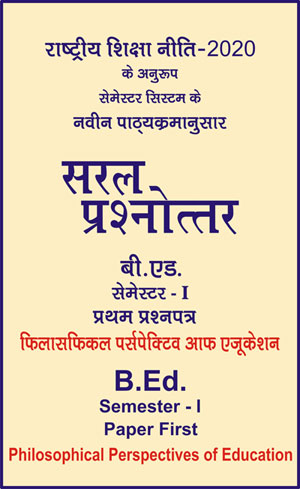|
बी एड - एम एड >> बी.एड. सेमेस्टर-1 प्रश्नपत्र-I - फिलासफिकल पर्सपेक्टिव आफ एजुकेशन बी.एड. सेमेस्टर-1 प्रश्नपत्र-I - फिलासफिकल पर्सपेक्टिव आफ एजुकेशनसरल प्रश्नोत्तर समूह
|
5 पाठक हैं |
|||||||
बी.एड. सेमेस्टर-1 प्रश्नपत्र-I - फिलासफिकल पर्सपेक्टिव आफ एजुकेशन (अंग्रेजी भाषा में)
Question- Explain aim and purposes of education in relation to time and place.
Or
Discuss the different aims of Education in present Indian scenario.
Answer -
Aims and Purposes in Relation to Different Times
A single glance at the history of education in any country will reveal that the aims of education have invariably gone hand in hand with the aims and ideals of social life. One can take the case of education in India.
1. Ancient Time: In ancient times, the Aryans believed that the aim and purposes of human life was to lead a prosperous and varied life in natural environment and to aim at total development. In the Upanishadic period, salvation was believed to be ideal of life and hence it was felt that anything which led to salvation was educative. Thus, Spiritual development was the aim and purposes of education in ancient India because it was also the social ideal of the time.
2. Medieval Times:
(i) Buddhist Education: During the Buddha period, Gautama Buddha established a new set of religious ideals which differed from the Brahman ideals. He placed the greatest emphasis upon religion, and consequently one of the main aims of education in the Buddhist monasteries was religious training. In other educational institutions, the students were also given training in other skills necessary for life.
(ii) Muslim Education: During the Muslim period, the social ideals and mode of life in the country underwent considerable changes due to Muslim influence. The Muslim system of education sought only to instil respect for their own religious principles, laws and traditions. Most of these aims were borrowed from their religious texts. At the same time, the Hindu schools provided education on the lines of the ancient educational system.
3. Modern Times:
(i) British Education: The arrival of the British in India led to further changes in the social life and ideals. The British administration was keen only on strengthening its hold in the country. Consequently, Macauley commented that the aim of their education was to create a class of individuals who were Indians only in colour and blood, but who were English in their interest, opinion, morality and intelligence. Schools following the British education turned out individuals good only for white collar jobs. Besides, they were also subjected to indoctrination in Christian principles.
(ii) Education in free India: After India had won independence, the pattern of society and its ideals underwent another change. Education no longer aimed at the propagation of a particular religion or at strengthening the roots of a foreign administration. The establishment of democracy helped to import democratic ideals into education also. Education was given the aim of achieving the all-round development of the nation. It, therefore, sought to provide education in the art and sciences, business and commerce, law and medicine, in fact, in every sphere of activity calculated to promote the nation’s interests. Education at all levels, primary, intermediate and college levels, was reconsidered and reframed in order to help in achieving the national goal. It was oriented to the needs of the nation. Various committees were set up to examine the pattern of education and to redefine its aims and objectives in the light of the new aims of the society and the nation. All the notable educationists - Sri Aurobindo, Mahatma Gandhi, Rabindranath, Vivekanand, Radha Krishnan, Dayananda and others - suggested the need for a comprehensive education based upon human psychology. Education in India today represents a synthesis between utility and idealism, keeping in view the needs and aims of modern India. The present pattern of education allows the presence of various kinds of syllabi. It stresses the importance of national values and aims of a synthesis between the individual and the social good.
Objectives of Education in Relation to Different Places:
Objectives of education differ not only in different times but also in different places. This will be amply demonstrated by a perusal of objectives of education in countries located at different places in the world.
|
|||||














